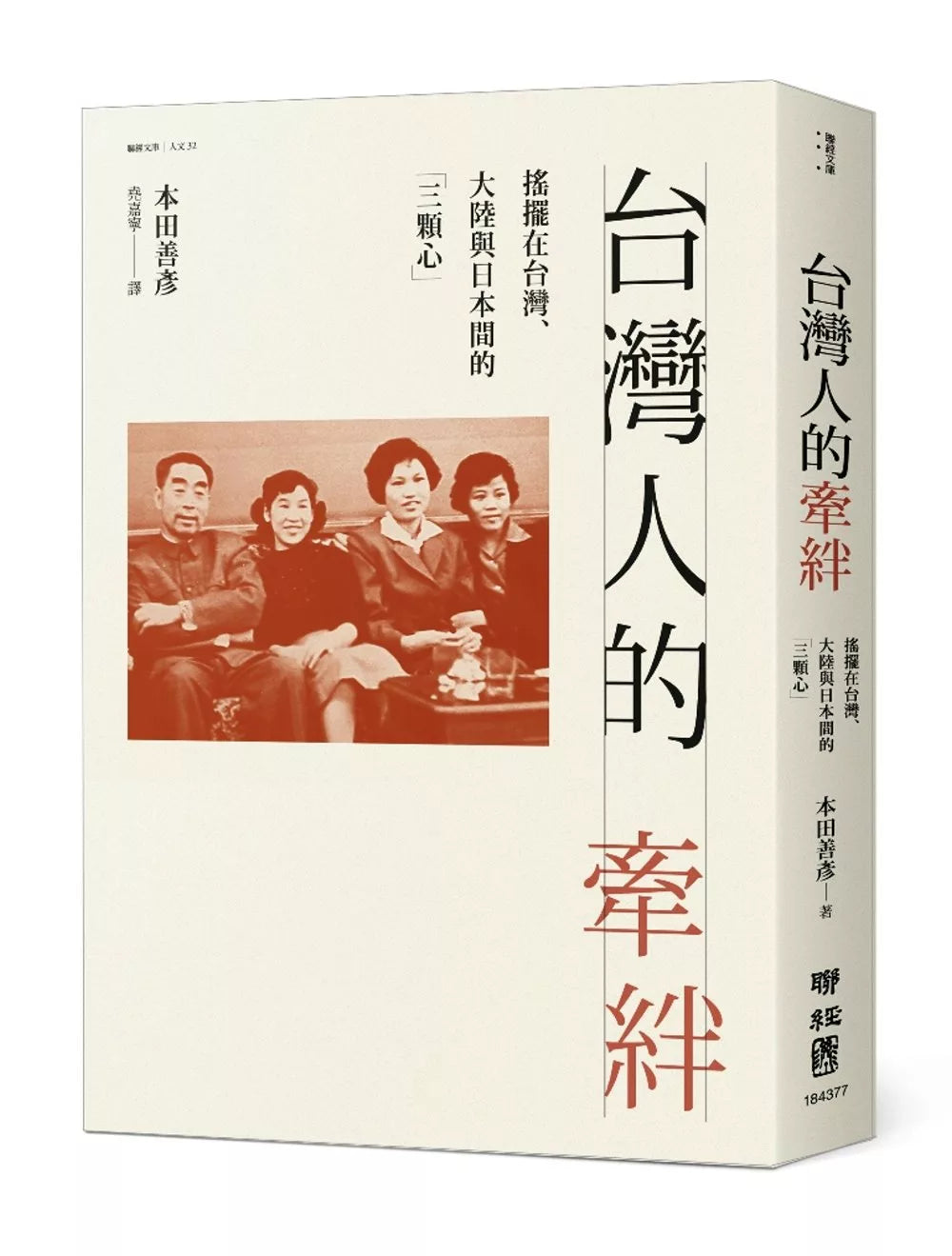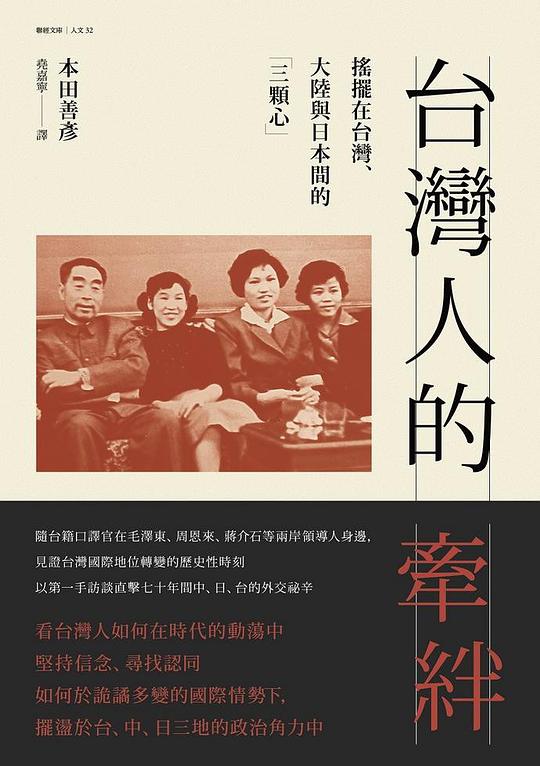1
/
of
2
Taiwanese people's ties
Taiwanese people's ties
Yoshihiko Honda Yao Jianing 译
Regular price
$23.99 USD
Regular price
Sale price
$23.99 USD
Unit price
/
per
Low stock
Couldn't load pickup availability
About Book
About Book
Accompanying Taiwanese interpreters, witness the historic moments of Taiwan's transformation in international status alongside leaders from both sides of the Taiwan Strait, including Mao Zedong, Zhou Enlai, and Chiang Kai-shek. Through firsthand interviews, we delve into the diplomatic secrets of China, Japan, and Taiwan over the past seventy years. We examine how Taiwanese people persevered through the turbulent times, sought common ground, and navigated the political dynamics of Taiwan, China, and Japan amidst the complex and ever-changing international landscape.
On September 29, 1972, Japan and the People's Republic of China issued a joint statement announcing the normalization of diplomatic relations between the two countries, formally declaring the severance of diplomatic relations between the government of the Republic of China in Taiwan and Japan. From Taiwan's withdrawal from the United Nations in 1971 and a secret visit by US National Security Advisor Henry Kissinger to Taiwan in 1971, to successive visits by US President Richard Nixon and Japanese Prime Minister Kakuei Tanaka the following year, Taiwan's international status underwent unprecedented changes.
Coincidentally, witnessing this scene on the diplomatic front lines on both sides of the Taiwan Strait were two Taiwanese people with similar backgrounds and whose life trajectories were closely connected to Taiwan, mainland China, and Japan.
Lin Li-yin—born in Taichung before World War II, her father, dissatisfied with the colonial discrimination he faced in Taiwan, moved with his family to Kobe, Japan during the war. The February 28 Incident left her and her family deeply disillusioned with the Kuomintang government. Fueled by a passion for reform and a desire to build a "new China," she, educated in Japan, decided to return to her "homeland" after high school to build a "new China." In the early years of the People's Republic of China, the Communist Party lacked personnel fluent in Japanese language and culture. This young Taiwanese woman, knowledgeable about Japanese and speaking a fluent Kansai accent, became Zhou Enlai's Japanese interpreter, witnessing the historic secret meeting between Mao Zedong, Zhou Enlai, and Tanaka Kakuei. She is the only participant in the "establishment of diplomatic relations between China and Japan" whose records are available and who agreed to be interviewed by the author.
Lin Chin-tsung—born in Tainan, she briefly studied in Shanghai after the war and later became one of the few Taiwanese to join the Ministry of Foreign Affairs. While stationed in Japan, she was the only Taiwanese diplomat to witness the severance of diplomatic ties between Taiwan and Japan, and she also served for many years as Japanese interpreter for Chiang Kai-shek and Soong Mei-ling. While Lin Li-yin's recollections reveal the close talks between Chinese and Japanese leaders that determined the direction of diplomacy, Lin Chin-tsung's experiences reveal the determination and hard work of Taiwanese diplomats attempting to turn the tide amidst a volatile and crisis-ridden international situation, and the ultimate despair of their inability to reverse the situation.
Many Taiwanese who received a Japanese education before the war grew up in an environment that exposed them to the "three hearts" of Taiwan, Japan, and China. This generation of Taiwanese, recognizing their own "three hearts," reflects on their journeys, sometimes with a perplexing caution and sometimes with complex twists and turns. Each of them made different decisions, influenced by the turmoil of the era, such as the February 28 Incident and the Chinese Civil War. Some chose to remain in Taiwan, some settled in Japan, and some went to mainland China. By virtue of their proficiency in Japanese language and culture, these individuals became indispensable figures in promoting cross-strait diplomacy.
The book's author, Yoshihiko Honda, personally interviewed many of the main characters in the book, focusing on Lin Li-yin and Lin Jin-song, and expanding to include Wu Ke-tai, an old "comrade" of left-wing youth Lee Teng-hui; Guo Pingtan, who hated the Kuomintang because of the suffering of his relatives in the February 28 Incident and chose to return to mainland China to participate in Taiwan-related work; and the well-known Japanese-based writer Chen Shun-shen. The interview touches on the complex mentality of Taiwanese people before and after the war, the feelings of choosing to stay in Taiwan or return to the "motherland"; the overview of Taiwan-related work in mainland China, and the development of delicate relations across the Taiwan Strait. More importantly, through interviews, this book reveals many diplomatic secrets not recorded in historical documents and archives, including the close talks between Mao Zedong and Tanaka Kakuei, Zhou Enlai's diplomatic skills, the important roles of Kuomintang veteran Liao Zhongkai and Liao Chengzhi, son of He Xiangning, in the CCP's work toward Japan, the anxious intelligence-seeking of Taiwan's representatives in Japan before the severance of diplomatic relations with Japan, and the truth behind the visits of Taiwanese independence advocates to mainland China.
Through these personal life stories, we can see how Taiwanese people, in this turbulent era, oscillate between Taiwan, mainland China, and Japan. Each person, as if possessing "three hearts," adheres to their own beliefs and strives to maintain the connection between these three lands.
On September 29, 1972, Japan and the People's Republic of China issued a joint statement announcing the normalization of diplomatic relations between the two countries, formally declaring the severance of diplomatic relations between the government of the Republic of China in Taiwan and Japan. From Taiwan's withdrawal from the United Nations in 1971 and a secret visit by US National Security Advisor Henry Kissinger to Taiwan in 1971, to successive visits by US President Richard Nixon and Japanese Prime Minister Kakuei Tanaka the following year, Taiwan's international status underwent unprecedented changes.
Coincidentally, witnessing this scene on the diplomatic front lines on both sides of the Taiwan Strait were two Taiwanese people with similar backgrounds and whose life trajectories were closely connected to Taiwan, mainland China, and Japan.
Lin Li-yin—born in Taichung before World War II, her father, dissatisfied with the colonial discrimination he faced in Taiwan, moved with his family to Kobe, Japan during the war. The February 28 Incident left her and her family deeply disillusioned with the Kuomintang government. Fueled by a passion for reform and a desire to build a "new China," she, educated in Japan, decided to return to her "homeland" after high school to build a "new China." In the early years of the People's Republic of China, the Communist Party lacked personnel fluent in Japanese language and culture. This young Taiwanese woman, knowledgeable about Japanese and speaking a fluent Kansai accent, became Zhou Enlai's Japanese interpreter, witnessing the historic secret meeting between Mao Zedong, Zhou Enlai, and Tanaka Kakuei. She is the only participant in the "establishment of diplomatic relations between China and Japan" whose records are available and who agreed to be interviewed by the author.
Lin Chin-tsung—born in Tainan, she briefly studied in Shanghai after the war and later became one of the few Taiwanese to join the Ministry of Foreign Affairs. While stationed in Japan, she was the only Taiwanese diplomat to witness the severance of diplomatic ties between Taiwan and Japan, and she also served for many years as Japanese interpreter for Chiang Kai-shek and Soong Mei-ling. While Lin Li-yin's recollections reveal the close talks between Chinese and Japanese leaders that determined the direction of diplomacy, Lin Chin-tsung's experiences reveal the determination and hard work of Taiwanese diplomats attempting to turn the tide amidst a volatile and crisis-ridden international situation, and the ultimate despair of their inability to reverse the situation.
Many Taiwanese who received a Japanese education before the war grew up in an environment that exposed them to the "three hearts" of Taiwan, Japan, and China. This generation of Taiwanese, recognizing their own "three hearts," reflects on their journeys, sometimes with a perplexing caution and sometimes with complex twists and turns. Each of them made different decisions, influenced by the turmoil of the era, such as the February 28 Incident and the Chinese Civil War. Some chose to remain in Taiwan, some settled in Japan, and some went to mainland China. By virtue of their proficiency in Japanese language and culture, these individuals became indispensable figures in promoting cross-strait diplomacy.
The book's author, Yoshihiko Honda, personally interviewed many of the main characters in the book, focusing on Lin Li-yin and Lin Jin-song, and expanding to include Wu Ke-tai, an old "comrade" of left-wing youth Lee Teng-hui; Guo Pingtan, who hated the Kuomintang because of the suffering of his relatives in the February 28 Incident and chose to return to mainland China to participate in Taiwan-related work; and the well-known Japanese-based writer Chen Shun-shen. The interview touches on the complex mentality of Taiwanese people before and after the war, the feelings of choosing to stay in Taiwan or return to the "motherland"; the overview of Taiwan-related work in mainland China, and the development of delicate relations across the Taiwan Strait. More importantly, through interviews, this book reveals many diplomatic secrets not recorded in historical documents and archives, including the close talks between Mao Zedong and Tanaka Kakuei, Zhou Enlai's diplomatic skills, the important roles of Kuomintang veteran Liao Zhongkai and Liao Chengzhi, son of He Xiangning, in the CCP's work toward Japan, the anxious intelligence-seeking of Taiwan's representatives in Japan before the severance of diplomatic relations with Japan, and the truth behind the visits of Taiwanese independence advocates to mainland China.
Through these personal life stories, we can see how Taiwanese people, in this turbulent era, oscillate between Taiwan, mainland China, and Japan. Each person, as if possessing "three hearts," adheres to their own beliefs and strives to maintain the connection between these three lands.
Publication Date
Publication Date
2015-07-29
Publisher
Publisher
聯經
Imprint
Imprint
Pages
Pages
344
ISBN
ISBN
9789570845914
share



